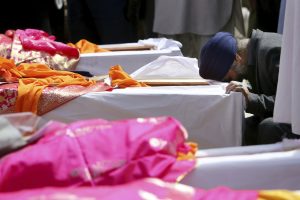Visakh Mathews and Sukanya Bali

It is unlikely that Afghan Sikhs and Hindus, age-old minority communities in Afghanistan, will survive the Taliban’s second time in power. The religious intolerance prevalent in Afghan society and rising security challenges posed by the Islamic State Khorasan (ISK), together with the exodus facilitated by the international Sikh NGOs, might end an era in Afghanistan sooner or later.
Historically, Hindus and Sikhs lived as merchants and traders. They were prominent money lenders in the Afghan economy. But prolonged conflict forced many to flee the country. According to some conservative estimates, the number of Sikhs and Hindus has reduced from a few hundred thousand during the 1980s to a few hundred during the American occupation.
The rise of intolerance is consistent with the rise of the pan-Islamist movement, led by the mujahideen in Afghanistan since the 1990s. Saudi-funded madrasas spread a hardline Wahabi ideology, which fueled the jihad against the Soviets in Afghanistan but narrowed the space for plurality in Afghan society. Islam was used in consolidating political power and for rallying rural Afghanistan with the call for Islamic jihad against the secular communist government, sidelining the role of non-Muslim communities in the future of the country.
When the Taliban first came to power in 1996, the group’s intolerance toward symbolism and practices of other religions was rampant. The promotion of orthodox Islam with Wahabi underpinnings purged the historical tolerance imbued in mainstream Islam as it had been practiced in Afghanistan. The Taliban destroyed the Buddhist statues in Bamiyan and other non-Islamic cultural artifacts in Afghanistan. Hindus and Sikhs were looked down upon and were asked to convert to Islam, and Muslims were strongly discouraged from visiting the shops of non-Muslims. Non-Muslims were made to wear yellow patches to identify them in public.
After the fall of the Taliban, the 2004 constitution provided certain assurances of security, material support, and political representation for Hindus and Sikhs. Despite these protections, there remained an air of intolerance toward Sikhs and Hindus in Afghan society. Religious minorities in Afghanistan have reported verbal harassment by the Sunni majority population over the years. Their properties were forcefully occupied and they were threatened and insulted. At government offices, they faced delays and were discriminated against in employment opportunities. Their children faced discrimination and were bullied in schools.
When the Taliban came back to power in 2021, they openly pledged to protect minorities. However, reports of minorities being killed by the Taliban indicate that their assurances cannot be trusted. The Taliban have reneged on several of their promises related to the freedom of women and human rights more broadly; there is little evidence to suggest that the situation of the Afghan Sikhs would be different under Taliban 2.0.
Sikh communities have faced myriad risks to life and property in Afghanistan since the mujahideen years. In 1988 a militant killed 13 Sikhs by opening fire during a religious festival and in 1989 a rocket hit a gurdwara and killed 17 Sikhs in Jalalabad. There were also incidents of extortion and persecution. More recently, there has been an uptick in large-scale targeted attacks on Sikhs as ISK expanded in Afghanistan, inflicting heavy casualties on the dwindling community.
In 2018, an attack claimed by ISK killed 19, most of them Sikhs, and in March 2020, 25 people were killed in a gurdwara in Kabul. In June, ISK fighters stormed the Karte Parwan gurdwara and killed two people. Sikh articles of faith, like the headdress, and close association with their places of worship make them relatively easy targets in ISK’s campaign. Besides large-scale attacks, there have been several incidents of vandalism and extortion against these communities. There have also been incidents of harassment at the hands of Taliban fighters, prompting calls for their evacuation.
ISK’s belief is in line with the Islamic State’s ideology to establish an Islamic caliphate that strictly observes Sunna and is governed by Islamic jurisprudence. They wish to carve out a purely Islamic state. Ideologues of the Islamic State model label non-Muslims and those who do not accept their interpretation of Islam as infidels, justifying their execution. This belief poses a perpetual threat to non-Islamic communities including Afghan Sikhs and Hindus.
In recent years the mass exodus of Afghan Sikhs and Hindus was facilitated by the Indian government, international Sikh NGOs, and the Sikh diaspora. After the March 2020 attack on the Sikh gurdwara, around 500 people were relocated to India under a private sponsorship program called “My Family, My Responsibility,” and dozens of people were evacuated to India during the fall of Kabul in August 2021, including Sikh MPs. The once vibrant gurdwaras in Afghanistan have largely been abandoned or put in the care of Muslim caretakers as Sikh families fled. The recent attack at the Karte Parwan gurdwara renewed calls for the community to leave the country, prompting the Indian government to issue 111 visas for Sikhs.
In the absence of any political representation, it is likely that the concerns of Hindus and Sikhs will be neglected in Afghanistan. There is little political advantage for the Taliban’s Sunni leadership in accommodating Afghan Sikhs and Hindus in the country. Moreover, the Taliban’s implementation of Sharia would increase intolerance toward them.
Evidently in Afghanistan, the Taliban and ISK are at loggerheads to dominate each other. However, it is unlikely that the Taliban would fight ISK for the sake of Afghan Sikhs and Hindus. Taliban leaders have assured protection to minorities; however, their political will and material ability to ensure the same is limited. The uncertainty will likely force Afghan Sikhs and Hindus to leave the country sooner or later as international NGOs and private-sponsored initiatives team up and call for their relocation.
No comments:
Post a Comment